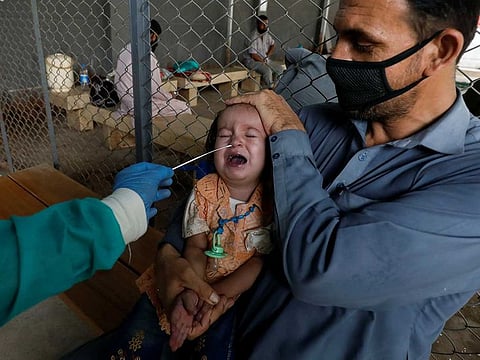Pakistan devises strategy to prevent COVID-19 outbreak during Eid Al Adha
700 cattle markets to be set up all over the country for the festival

Islamabad: Hardly a week has passed since the Pakistan government reported a substantial decrease in number of new cases of coronavirus, when the authorities are confronting a new challenge regarding prevention and containment of the virus — this time, the big worry is over Eid Al Adha, which will be likely celebrated on July 31.
Prime Minister Imran Khan and the country’s Health Ministry, too, have issued statements to caution people against a resurgence of the virus if strict preventive measures are adopted during Eid Al Adha.
In June, Pakistan witnessed upto 5,000-6,000 new cases of coronavirus daily. This month, the figure has come down to below 3,000 — which in itself is a very positive sign.
Pakistan’s National Command and Operations Centre (NCOC), in a meeting on Monday, finalised the standard operating procedures (SOPs) regarding the handling of cattle markets, their timings and smart lockdown measures in several places of the country ahead of Eid Al Adha.
In the meeting, that was presided over by NCOC Chairman Federal Minister Asad Umar, it was decided that the same plan that was followed during Eid Al Fitr in May for congregational prayers will be adopted for Eid Al Adha as well.
The Chief Minister of Punjab, Usman Buzdar, provincial Health Minister Yasmin Rashid, Punjab Law Minister Raja Basharat, along with other provincial representatives and senior officers attended the session.
The meeting revealed that around 700 cattle markets will be functioning across Pakistan on the eve of Eid Al Adha and necessary guidelines have been forwarded to all the stakeholders including deputy commissioners, district health officers and the police.
In Karachi, along the Super Highway, a cattle market has already been set up with 60-70 walkthrough gates and all SOPs have been implemented. In the market, around 100,000 sacrificial animals have already been brought in.
Addressing the meeting through a videolink, Umar said the cattle markets would be set up outside the cities and a layout of these markets would be shared with each stakeholder as well as the public so that health protocols and guidelines could be followed by all.
Salient points of SOPs:
• It will be ensured that the cattle markets operate from 6am to 7pm.
• Screening/checking body temperature will be mandatory for all those entering the cattle markets.
• Wearing face masks and practising social distancing will be mandatory.
• Only a designated number of people will be allowed inside at one time to avoid over-crowding.
30 cities identified as new hotspots of coronavirus
The NCOC has identified 30 cities as hotspots for coronavirus, which have seen the highest number of infected cases. These areas have been traced with the help of the auto-trace software and National Information Technology Board maps.
Another minister tests positive
Barely days after Minister for Railways Rashid Ahmed and Minister for Information and Technology Aminul Haq recovered from coronavirus, Tariq Bashir Cheema, the Minister for Housing and Works, has also tested positive for COVID-19 and has gone into quarantine.
According to Dr Waseem Khawaja, the spokesperson for the Pakistan Institute of Medical Sciences, the minister was admitted to hospital after his condition deteriorated. Doctors were conducting further tests on him.
More than 250,000 cases, 161,000 recoveries
Pakistan on Monday reported 251,625 positive cases of coronavirus and 5,266 deaths — an increase of 2,769 new cases and 69 deaths in the last 24 hours. The number of countrywide tests, however, remained as low as 22,532 while 1,837 patients were reported to be in critical condition. The total number of recoveries from the virus stood at 161,917 on Monday, with more than 5,000 having recovered in one day.


